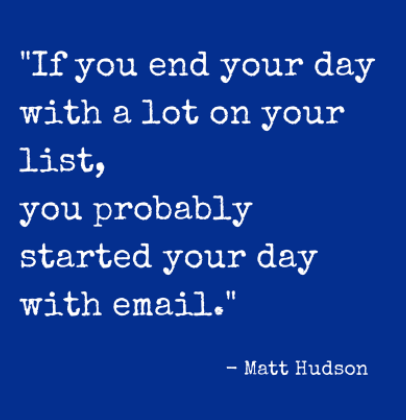
Home Office Time Management: To-Do Lists Truths.
“If you end your day with a lot on your list, you probably started your day with email.” – Matthew Hudson
Ain’t that the truth.
Every time management expert, from Brian Tracy to Julie Morgenstern, tells you to start the day with your most important task.
When I do this myself I find that I am much more productive. I either complete an important task or make significant in-roads on bigger projects. That’s a nice feeling to have at the end of the day, rather than asking myself “Did I get anything done today?”
It’s the big projects that move your business/your career forward. Home Office Time Management Helps.
The little details are the details and, while necessary, they follow the development of a new product, service, marketing campaign, book/eBook, and so forth. Much of what is in emails are details and distractions.
How to Avoid the Email Sinkhole: 3 Tips for Smart Home Office Time Management
- Brian Tracy, goal-setting and time management expert, tells you to “Eat the Frog” . Do your most important and most dreaded (funny how often these two are the same) task first thing in the morning – whenever your own day starts. By doing your hardest task first, you get it out of the way. It’s no longer hanging over you and blighting your day.
- Julie Morgenstern of Organizing From the Inside Out , O Magazine, and Never Check Email in the Morning says emails are a time-sink. You get lost in lots of little details that do not build your business or boost your career. Morgenstern’s home office time management clients block out time for an important project and start working on it as soon as they arrive at their desk in the morning. Then she recommends they block out set times to check emails, such as 10 AM, 1PM and 4PM. They let people know about their email check-in times and suggest contact by IM or phone if it is a real emergency (and define emergency).
- Neuroscientists have demonstrated that your brain is functioning at peak performance early in the day, after you wake-up. That is when your brain is rested and refreshed. It might be smart to harness that brain power by doing your most important demanding tasks at that time. Do the routine tasks later in the day when your brain is getting fatigued and you can work on semi-autopilot. At the end of your workday review what you have done and set or confirm your priority-task-first-thing-in-the-morning-project for tomorrow. This is how you apply the latest in neuroscience to home office time management.
Home Office Time Management = Feeling of Accomplishment
A feeling of accomplishment at the end of the day is a great motivator. It helps you end your workday cleanly, and minimizes the feeling that you need to keep working-and-working. The next day you have a track record of task achievement and you repeat it again.
Read more about Home Office Time Management:
Eat the Frog
Click here for Brain Science Explains Brain Power
5 Ways to Use Emails More Efficiently
HT to Matt Hudson of Rick Segel and Associates. Matt and Rick are retail marketing masters par excellénce. They help others grow their businesses.
Learn more about how to set-up and decorate your home office to support good time management and creativity. Buy your own copy:The Smarter Home Office: 8 Simple Steps to Increase Your Income, Inspiration and Comfort.
A few additional points to add…
*TURN OFF NOTIFICATIONS! Those little alerts on your computer or phone are the quickest way to shift your focus off of what you are working on.
*Filter Email Message. Most messages will not need our immediate attention. It works well to create an effective filtering system so that newsletters, promotions and random updates do not go into your inbox. Save the inbox for the correspondence that DOES need more immediate attention.
*Don’t be afraid to delete. Most newsletters or articles that end up in our inbox stay there because we find the content interesting and want to get back to it at some point. However, if you are subscribed to a newsletter long enough, the content will come back around to you in the future. You won’t truly be missing out. I promise!
Nicole -Thanks for sharing these excellent tips on email management. Three more ways to make more time for your priority projects and your life.